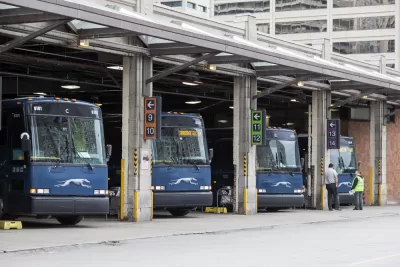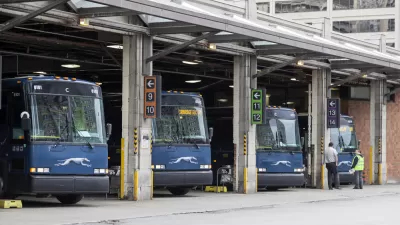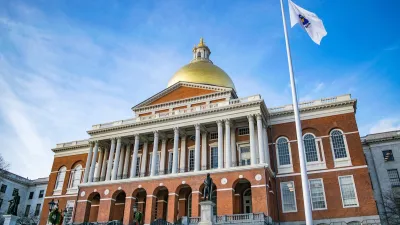Although intercity buses provide a crucial service to millions of Americans, the industry has been shut out of recent pandemic assistance programs while riders continue to experience dismal facilities and shrinking service options.

Despite serving twice as many customers as Amtrak, intercity bus service did not receive direct aid during the pandemic from either the CARES Act or the American Rescue Act, writes Jake Blumgart. "For tens of millions of Americans, intercity bus companies like Greyhound, Megabus, and myriad smaller actors are an essential part of the nation’s transportation system." These services "have long served as a lifeline to areas without train or plane service, and for riders who don’t have access to a car. It is an essential service for rural America, for students, and for low-income people."
Because bus travel primarily serves disadvantaged groups, "advocates say that further federal aid should be extended to their mode of travel, as it was for so many others earlier in the pandemic. Failing that, local and, especially, state policymakers could help to fill the gap."
Unlike other transportation industries, the deregulation of intercity bus travel in the 1980s "did not spur a surge of new entrants or innovation. Instead, Greyhound gobbled up many of its big competitors while downsizing its operations" before going bankrupt in 1990. "Today, very few operators are stopping on the side of a country road. Although Greyhound is still the largest motorcoach company, it is a shadow of its former self and the newer competitors that finally started to emerge in the 2000s were largely non-union."
This year, as the Delta variant started to spread, only roughly 60 percent of riders have returned to intercity buses, and the companies are still struggling to rebuild. Blumgart argues that "[t]he industry never saw the public intervention that surrounds rail and airline travel because, for the most part, both its riders and its operators are unheard in policy circles." But even in the absence of federal aid, "[b]us advocates say that local officials can ensure riders have access to decent facilities," such as accommodations beyond city sidewalks or parking lots with no shelter from the elements.
FULL STORY: Intercity Bus Service Gets No Respect from Government

Maui's Vacation Rental Debate Turns Ugly
Verbal attacks, misinformation campaigns and fistfights plague a high-stakes debate to convert thousands of vacation rentals into long-term housing.

Planetizen Federal Action Tracker
A weekly monitor of how Trump’s orders and actions are impacting planners and planning in America.

San Francisco Suspends Traffic Calming Amidst Record Deaths
Citing “a challenging fiscal landscape,” the city will cease the program on the heels of 42 traffic deaths, including 24 pedestrians.

Defunct Pittsburgh Power Plant to Become Residential Tower
A decommissioned steam heat plant will be redeveloped into almost 100 affordable housing units.

Trump Prompts Restructuring of Transportation Research Board in “Unprecedented Overreach”
The TRB has eliminated more than half of its committees including those focused on climate, equity, and cities.

Amtrak Rolls Out New Orleans to Alabama “Mardi Gras” Train
The new service will operate morning and evening departures between Mobile and New Orleans.
Urban Design for Planners 1: Software Tools
This six-course series explores essential urban design concepts using open source software and equips planners with the tools they need to participate fully in the urban design process.
Planning for Universal Design
Learn the tools for implementing Universal Design in planning regulations.
Heyer Gruel & Associates PA
JM Goldson LLC
Custer County Colorado
City of Camden Redevelopment Agency
City of Astoria
Transportation Research & Education Center (TREC) at Portland State University
Jefferson Parish Government
Camden Redevelopment Agency
City of Claremont




























